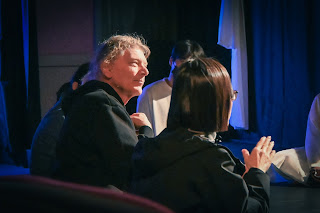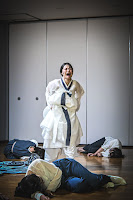Abandoned
Abandoned: a thousand tongues / A Requiem for the Dead
... extremely challenging to write this post ... process began with July workshops (12 three hour sessions) ... continued with August focused training (14 three hour sessions) ... shifted towards structured production in Sept. (7 three hour sessions) ... performances in mid-late October (9 ensemble sessions including two performances) ... some how
... a generously provided space from 9am - 1pm ...
... two co-founders of the project, 36 workshop participants resulting in 10 actors to which 4 more theatre workers were added to the creative team ...
... directors notes:
Welcome.
I should say at the outset we invite you to think of the action you are to witness as a Requiem - an act of remembrance. This years end of October hovers specifically over the torrent of tears from the trauma of Itaewon.
We present angels giving voice in a “poetic language” intimately connected, surreally flying with the bodies of those who have been lost by the shroud of death. Yes there are shouts of pain, fierce struggle, shrieking sadness, howls of anguish and helplessness all done with ritualization and song intended to release the suffering.
Many are angry desiring to enact their wish, the wish to return to the world. The Angels are important and active: both ethereal and earthly, confronting and sustaining an intensity at once dead and living. They also take our minds back to the migrating birds, sharing with them both wings and the habit of crossing and returning between realms lighting a path to cross borders and traverse separate worlds.
Abandoned: A Thousand Tongues is part of an ineffable feeling of longing- a journey we need to continue to take a good long, careful look, to ponder and reflect, to mitigate our fears and anxieties assisting us to accept the idea of life continuing beyond 'me'. - raymon
... unknowingly the workshops had been publicized as via negative ... we chose to embrace this focus folding in textwork, a practice i had developed over the years ... workshop one required participants to memorize a one minute text ... workshop two was offered to those with previous workshop experience with us & a text from Face of Rhythm by Kim Hyesoon was randomly assigned ...
... at the conclusion of workshop two we offered all a three month (27 sessions) further investigation which would result in a performance ... we had negotiated use of the rehearsal space for free by committing ourselves to two performances ... one a street performance and the other in Space T ... we anticipated 5 would continue ... 10 committed - five students of Sangmyung University and five recent university graduates ...
... i had formulated a process towards performance involving cycles of action ... refining a practice while working on Grass Tomb with students from the University of Saskatchewan ... (i. Call: Beginning relaxed and slow & regular - gradual Nenda Nego a calling) / (ii. Move: Acceleration spiral form increasing / dividing the beat / quicker Tying Talda Tahra develop) / (iii. Knot: entanglement … maintain a fast rhythm repeated Knot Mennunda Mehdgo … crisis) / (iv. Untie: reaching a calmness Punda) ...
... as well grouped sessions following the foci: textwork, dancingness, singingness and playfullness ... each week from the training sessions in August a structure developed ... it was an intuitive structure based on survival ... was reading Mary Ovelie "... Six viewpoints refers to a unique and radical emphasis on infinitesimally small particles of awareness" (Standing in Space The Six Viewpoints Theory & Practice preface) ... that was it ... i had done a bit of research on Kim Hyesoon ... with a handful of prompts began ...
–––––––––––––––––––––––––––––––––––––––––––––––––––––––––––––––––––––––––––––
Prompts:
2 Training: annihilation of the body
3 Concentration, zone of the heart, the actor’s anatomy
4 Bodily gestures, face of the body, sculpting; unvoiced score, unarticulated score; poor actor
5 Fatal mistakes, tautology, common beliefs
6 A- new, transgression, training- role
7 Living matter: striving for balance turns into imbalance and vice versa/opposites; flash of a cut, radiation, frequency of cutting
8 Inner climaxing in the physiological score; hidden sexual scores, building connections with the primary energy/reservoir
9 Humility, fear of the sacred, not ‘yes’ – resignation from ‘no’
10 Holy- actor, bared to the last, living sacrifice; non- private, fulfilment
(Cynkutis, Zbigniew. Acting with Grotowski: Theatre as a Field for Experiencing Life . Taylor and Francis. Kindle Edition. )
Prompts
“Anything will lose its meaning if you repeat it often enough,” she said. “At first you feel you are getting the hang of it, but then as time goes by, you feel like the meaning’s changing and becoming tarnished. Then, finally, it gets lost. Completely fades to white.”
Love, Love, Love, Love, Love, Lo, ve, Looo, veee, Love, LoveLo,-veLo,-veLo.
Eternity, Eternity, Eternity, Eter,-nity, Eeeter,-niiity.
Now the meanings were gone. Just like the inside of my head, which had been a blank slate from day one.
she is abandoned in the animals’ cage, back hill, backyard, marsh, sea of blood and such, and the abandonment doesn’t stop after this first phase. she goes through a terrible abandonment up
to three times in the stream, Hwangch’ôn river, sea
of blood, east sea, deep inside the mountain beyond the Ch’ôngch’ôn river, even inside a mountain cave. The abandoned Paridegi is raised by cranes, magpies, turtles, good-deed granny and grandpa, sea dragon god, mountain god, buddha, etc. There is even a version of the text that says that her parents took her back to raise her and were abusive to her. Anyway, Paridegi grows up thinking that she is an orphan. The place in which Paridegi is abandoned is an unreal space, and all those who raise her are unreal characters. The spaces in which she is abandoned are places where graves are made or where the dead are secretly discarded. Hence, when her foster parents find Paridegi as an infant, insects fall out from her eyes, ears, mouth, and nose. . . .
being alive inside the space of death as nothingness mu and called it hyônbin 현빈. Hyôn is something closed, something black. eyes are closed, so everything is black.
(from various sources primarily interviews and essays)
–––––––––––––––––––––––––––––––––––––––––––––––––––––––––––––––––––––––––––––
::Note:: ... still more to write ... will add in the days to come ...




